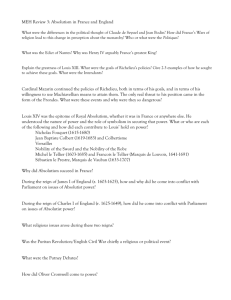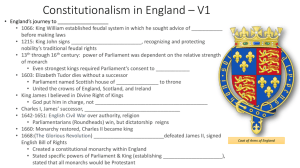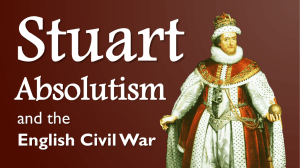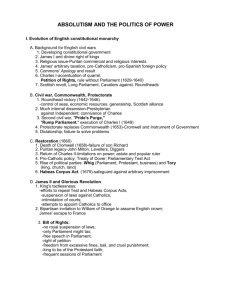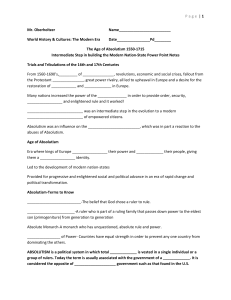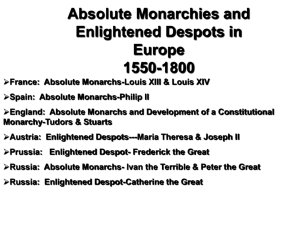ASBOLUTISM vs constitutionalism
advertisement
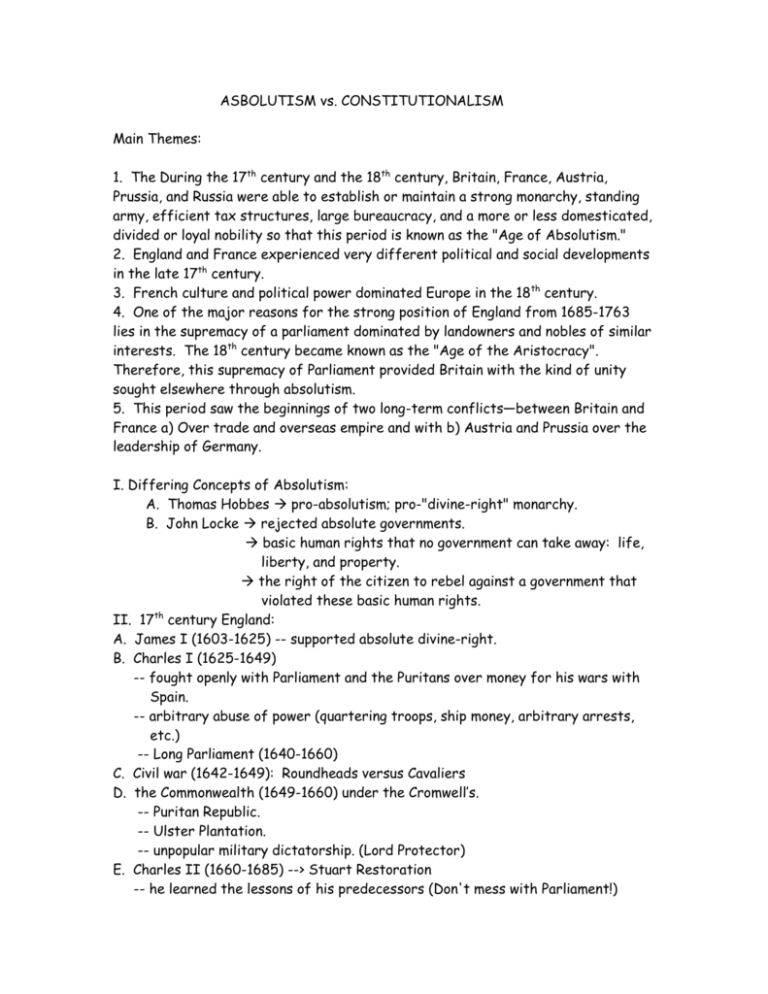
ASBOLUTISM vs. CONSTITUTIONALISM Main Themes: 1. The During the 17th century and the 18th century, Britain, France, Austria, Prussia, and Russia were able to establish or maintain a strong monarchy, standing army, efficient tax structures, large bureaucracy, and a more or less domesticated, divided or loyal nobility so that this period is known as the "Age of Absolutism." 2. England and France experienced very different political and social developments in the late 17th century. 3. French culture and political power dominated Europe in the 18th century. 4. One of the major reasons for the strong position of England from 1685-1763 lies in the supremacy of a parliament dominated by landowners and nobles of similar interests. The 18th century became known as the "Age of the Aristocracy". Therefore, this supremacy of Parliament provided Britain with the kind of unity sought elsewhere through absolutism. 5. This period saw the beginnings of two long-term conflicts—between Britain and France a) Over trade and overseas empire and with b) Austria and Prussia over the leadership of Germany. I. Differing Concepts of Absolutism: A. Thomas Hobbes pro-absolutism; pro-"divine-right" monarchy. B. John Locke rejected absolute governments. basic human rights that no government can take away: life, liberty, and property. the right of the citizen to rebel against a government that violated these basic human rights. th II. 17 century England: A. James I (1603-1625) -- supported absolute divine-right. B. Charles I (1625-1649) -- fought openly with Parliament and the Puritans over money for his wars with Spain. -- arbitrary abuse of power (quartering troops, ship money, arbitrary arrests, etc.) -- Long Parliament (1640-1660) C. Civil war (1642-1649): Roundheads versus Cavaliers D. the Commonwealth (1649-1660) under the Cromwell’s. -- Puritan Republic. -- Ulster Plantation. -- unpopular military dictatorship. (Lord Protector) E. Charles II (1660-1685) --> Stuart Restoration -- he learned the lessons of his predecessors (Don't mess with Parliament!) ----- religious toleration, but leaned toward the Catholics. Test Act (1673). Habeas Corpus Act (1679). he launched bold new foreign policy ventures chalenging the Dutch for the commercial leadership of Europe. F. James II (1685-1688) -- became unpopular because of his open Catholicism and return to absolute rule. G. William & Mary --> "Glorious Revolution" (1688); a bloodless coup. -- Parliament now reigned supreme. -- never again would British kings be as powerful as Parliament. -- English Bill of Rights (1668-1689) --> it settled all of the major issues between the kings and Parliament H. development of the modern British political system: -- Whigs and Tories (distinctions between political party). -- evolution of the Cabinet system. -- Prime Minister (Robert Walpole, first P. M.) III. The Age of Louis XIV: (the "Sun King") A. Henry IV of Navarre (1589-1610) -- first to establish the Bourbon family. -- he began to curtail the privileges of the Fr. nobility. -- he issued the Edict of Nantes (** see treaties sheet **) B. Louis XIII (1616-1643) -- Cardinal Richelieu (machiavellian pragmatist) -- he committed Fr. to the Protestant side in the Thirty Years' War. C. Louis XIV (1643-1715) -- goals: -- make France the strongest country in Europe. -- make France the intellectual and political "light" to the rest of the world. -- L'etat, c'est moi! [I am the State!] -- government and administration: -- firm and uniform administration (intendants) -- war became an activity of the state (the armed forces were formerly in private hands). -- strengthened the army. -- built Versailles (keep the nobles under his watchful eyes!) -- never called the Estates-General. -- economic and financial policies -- costly, inefficient methods of tax collecting (nobility not taxed) -- Colbert, finance minister. -- mercantilism. -- monopolies abroad (ex: French East India Company) -- religion -- Protestants suffered. -- religious unity considered necessary to strengthen his rule. -- revoked the Edict of Nantes. -- vigorous foreign policy -- War of the League of Augsburg. -- War of the Spanish Succession. -- War of Devolution. -- effects of his reign: POSITIVE/ NEGATIVE he tried to make France more powerful. he centralized the French government. he improved the French militarily. he made France a commercial rival of Britain. he tamed the French aristocracy. he made the King and the State one and the same. he taxed the peasants, not the nobility. he was too extravagant (he put France into great debt). the court at Versailles was too removed from the lives and problems of the common people. IV. Eastern Europe: A. Hapsburgs vs. Hohenzollerns -- growing competition in the Germanys. -- Pragmatic Sanctions (Maria Theresa). -- Hapsburg interests --> Bohemia, Austria, Hungary, Ottoman Empire (Balkans). -- Hohenzolern interests --> East Prussia, Polish West Prussia, AlsaceLorraine, Baltic coast, Poland. B. policies of Leopold II, Maria Theresa, Joseph II --> "Enlightened Despots" C. policies of Frederick William, the "Great Elector", Frederick I, and Frederick II, the "Great". D. Russia in the 17c and early 18c: -- Peter the Great --> "Westernization of Russia". ("Windows to the West") -- Catherine the Great --> expansion of Russian borders in SW; solidifying the power of the Czars; sometimes seen as an "Enlightened Despot" (this is questionable). ADDITIONAL TERMS TO KNOW: Bossuet "Contract theory" of government Petition of Rights (1628) Puritans ship money Grand Remonstrance Cavaliers Roundheads "Rump" Parliament Navigation Act (1651) Clarendon Code Test Act (1673) Whigs Tories Toleration Act (1689) Act of Settlement (1701) Bill of Rights (1688-89) Oligarchy Hanoverians Sully Cardinal Richelieu Cardinal Mazarin intendants Nobless d'Eppe Nobless d'Robe Fronde Colbert Pragmatic Sanctions Junkers Xenophobia Boyars Battle of Poltava


